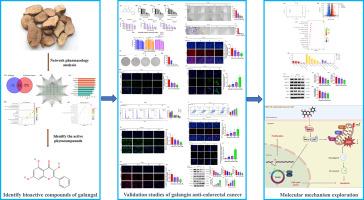高良姜通过MAPK信号通路调控结直肠癌的研究
IF 4.7
2区 医学
Q2 IMMUNOLOGY
引用次数: 0
摘要
结直肠癌(CRC)是全球主要的健康负担,由于转移和复发率高,预后差。高良姜已显示出潜在的抗癌作用,但其机制尚不清楚。本研究旨在探讨高良姜的抗结直肠癌作用及其可能机制。利用网络药理学方法探索高良姜治疗结直肠癌的生物活性化合物,并预测其潜在的靶点和通路。此外,我们采用了广泛的检测方法来确定高良姜的生物活性化合物对CRC细胞体外生物学功能的影响,包括CCK-8、EdU染色、菌落形成、伤口愈合、transwell实验和Western blot分析。通过网络药理学分析,我们确定高良姜素是高良姜的生物活性化合物。高良姜能明显抑制结直肠癌细胞的体外增殖和迁移,且具有低毒性。它通过增加活性氧(ROS)水平和降低线粒体膜电位,将细胞周期阻滞在G0/G1期,促进细胞凋亡。RNA测序结果显示高良姜素调节MAPK信号通路,Western blot分析进一步证实高良姜素抑制MAPK的激活。重要的是,使用MAPK信号通路激活剂进一步验证高良姜素通过抑制MAPK信号通路抑制HCT15细胞增殖。我们的研究表明,高良姜中的生物活性化合物高良姜素通过调节MAPK信号通路,对结直肠癌细胞的增殖和转移具有明显的抑制作用。我们的研究结果表明高良姜是一种很有希望的CRC治疗药物,值得进一步研究在体内甚至临床应用。本文章由计算机程序翻译,如有差异,请以英文原文为准。

Investigation of galangin against colorectal cancer through MAPK signaling pathway modulation
Colorectal cancer (CRC) is a major global health burden with poor prognosis due to high metastasis and recurrence rates. Galangal has shown potential anti-cancer effects, but its mechanisms remain unclear. This study aims to dig out the anti-CRC effects of galangal and its potential mechanisms. Network pharmacology was used to explore the bioactive compounds and predict potential targets and pathways of galangal against CRC. Additionally, we employed a wide range of assays to identify the impact of the bioactive compound of galangal on the biological function of CRC cells in vitro, including CCK-8, EdU staining, colony formation, wound healing, transwell assay and Western blot analysis. Through network pharmacology analysis, we identified galangin as the bioactive compound of galangal. Galangin significantly inhibited the proliferation and migration of CRC cells in vitro with low toxicity. It arrested cell cycle at the G0/G1 phase and promoted apoptosis by increasing reactive oxygen species (ROS) levels and decreasing mitochondrial membrane potential. RNA sequencing revealed that galangin modulated the MAPK signaling pathway, which was further confirmed by Western blot analysis showing inhibition of MAPK activation. Importantly, MAPK signaling pathway activator was used to further verified that galangin inhibited HCT15 cells proliferation by suppressing MAPK signaling pathway. Our research suggested that galangin, which is the bioactive compound of galangal, demonstrates potent inhibitory effects on CRC cell proliferation and metastasis by modulating the MAPK signaling pathway. Our findings suggest that galangin is a promising candidate for CRC therapeutics, warranting further investigation for in vivo even clinical application.
求助全文
通过发布文献求助,成功后即可免费获取论文全文。
去求助
来源期刊
CiteScore
8.40
自引率
3.60%
发文量
935
审稿时长
53 days
期刊介绍:
International Immunopharmacology is the primary vehicle for the publication of original research papers pertinent to the overlapping areas of immunology, pharmacology, cytokine biology, immunotherapy, immunopathology and immunotoxicology. Review articles that encompass these subjects are also welcome.
The subject material appropriate for submission includes:
• Clinical studies employing immunotherapy of any type including the use of: bacterial and chemical agents; thymic hormones, interferon, lymphokines, etc., in transplantation and diseases such as cancer, immunodeficiency, chronic infection and allergic, inflammatory or autoimmune disorders.
• Studies on the mechanisms of action of these agents for specific parameters of immune competence as well as the overall clinical state.
• Pre-clinical animal studies and in vitro studies on mechanisms of action with immunopotentiators, immunomodulators, immunoadjuvants and other pharmacological agents active on cells participating in immune or allergic responses.
• Pharmacological compounds, microbial products and toxicological agents that affect the lymphoid system, and their mechanisms of action.
• Agents that activate genes or modify transcription and translation within the immune response.
• Substances activated, generated, or released through immunologic or related pathways that are pharmacologically active.
• Production, function and regulation of cytokines and their receptors.
• Classical pharmacological studies on the effects of chemokines and bioactive factors released during immunological reactions.

 求助内容:
求助内容: 应助结果提醒方式:
应助结果提醒方式:


